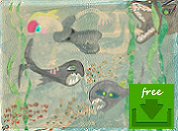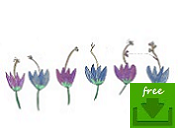 Claire's Original Art Greeting Cards
There is nothing that says I care like a real snail-mail greeting card!
Click on a picture above for a plain-paper printable greeting card pdf.
Print on regular 8.5 by 11 printer paper. Fold twice so that the art is on the front and the title and copyright are on the back.
Write your greeting on the inside.
Mail in an A2 Invitation Envelope.
Claire's Original Art Greeting Cards
There is nothing that says I care like a real snail-mail greeting card!
Click on a picture above for a plain-paper printable greeting card pdf.
Print on regular 8.5 by 11 printer paper. Fold twice so that the art is on the front and the title and copyright are on the back.
Write your greeting on the inside.
Mail in an A2 Invitation Envelope.Quit Trying and Start Allowing with Wayne Dyer’s Change Your Thoughts, Change Your Life
May 1st, 2008 · No Comments

I like new age thinking because it teaches emotional intelligence. In Change Your Thoughts–Change Your Life: Living the Wisdom of the Tao Wayne Dyer interprets 81 versus of Lao-tzu’s Tao Te Ching. You can practice with one verse a day, then start over and do it again. As much as I enjoy Dr Dyer’s work, however, I can’t help but think he is unclear on a basic concept. He gives himself away with his language.
Dr Dyer is forever using the words “hold back,” “refrain,” and “refuse.” Any new ager worth her mantra knows that holding back, refraining, and refusing, are exactly what not to do.
Dr Dyer doesn’t seem to have a full appreciation of the extent to which language effects our thoughts and emotions and moods.
On page 38 “By holding back ego’s demands, even for a few moments, you will feel more and more fulfilled.” (Italics mine.) How about “By letting go of ego’s demands . . .”?
There’s a big difference in how your brain feels between holding back and letting go. Holding back requires tension and effort. Letting go requires opening up and relaxing.
On page 220: “When you refrain from engaging in judgments based solely on looks, you paradoxically become an instrument for change.” (Italics mine.) How about “Engage in enjoyment of another person however he or she may look . . .”?
On page 320: Dr Dyer exhorts the reader about “humbly refusing to be ahead of or above your conversational partner.” (Italics mine.) How about “humbly listen so that you stay with . . . “?

On page 337: “A happy mind is sick of sickness—it refuses to anticipate that things will get worse.” How about “A happy mind seeks wellness—it anticipates that things will get better.” (For a treatise on transcending the mind’s propensity to dwell on illness, read Eckhart Tolle’s The Power of Now.)
Dr Dyer does have a lot to say that’s worth reading. I particularly liked his study of the difference between trying and allowing, which he somehow gets out of Lao-tzu’s “and the mystery itself is the doorway to all understanding.” (See pages 4 and 5.) The one of his analogies that works for me is playing the piano. A lot of effort goes into learning a tune, but at some point, if you want to enjoy playing, you have to let go of that trying and listen to yourself. That’s when your efforts transcend into music.
 My yoga teacher Suraya Keating as a very good way of putting this—as she glides around the studio, she asks us “Where can you let go of effort?” and she tells us “Open to the pose.” I can stretch more deeply and reach much farther when I neither stretch nor reach, but let go of effort and open. It’s amazing!
My yoga teacher Suraya Keating as a very good way of putting this—as she glides around the studio, she asks us “Where can you let go of effort?” and she tells us “Open to the pose.” I can stretch more deeply and reach much farther when I neither stretch nor reach, but let go of effort and open. It’s amazing!
Tags: Emotional Freedom · Health and Happiness · Non Fiction







0 responses so far ↓
There are no comments yet...Kick things off by filling out the form below.
Leave a Comment